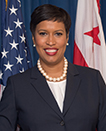Washington, DC
Know Before You Go
Making the decision - should I go?
- Do you have the physical stamina to stand outside in the heat, in a large crowd, for hours or more, and then spend additional hours getting back home or to your hotel?
- Are you comfortable in extremely large crowds?
- Can you walk long distances to get to and from your destination?
- If you are planning to bring your children can you care for and keep track of them in large crowds for long hours?
-
What's the best mode of transportation for me?
- Car
- Bus
- Public Transit
- Bike
- Check the weather forecast.
- Sign up to receive Alert DC text or email notifications while you're in town
- Cell phone use may be limited. Have an alternate plan for staying in touch.
- Pack light and right.
- Wear light clothes and comfortable shoes. Bring food, water, medications, maps, tickets
Parents should ensure that young children have an information card on their person (preferred in their pocket) that includes the following:
- Their name, address, date of birth and age
- Parent and/or guardian name
- Cell phone numbers for Parent and/or guardian attending
- Name and phone number for an offsite but local family member (as cell phone service is expected to be lost in the downtown area from time to time)
- Any medical issues or concerns
The same advice applies for diminished capacity adults and diminished capacity elderly persons (i.e. those that would be deemed critical missing persons if lost). Persons escorting these children and adults should utilize their cameras and/or smart devices to take (and have available) two digital photos. The first photo should be a front facial shot for clear identification and the second should be a head-to-toe shot for clear clothing description.
Those on medication should have their medication on their person (i.e. asthmatic children should be in possession of their inhaler). US Park Police will not administer any medication, but medical services personnel will be in the area.
When You Arrive
- Know where you are: Mark it on a map, make a note and/or take a photo
- Designate a meeting place and time in case you get separated from your group. Exchange contact information.
- Be prepared to walk long distances to get to your destination.
If traveling on a bus:
- Have a "captain" of the bus responsible for your trip.
- Write down your bus number and the location where it is parked.
- Write down a roster of passengers so you don't leave anyone behind. Include mobile phone numbers.
- Consider using the "buddy system" so someone else knows whether you made it back.
- Announce a planned departure time and make sure everyone knows it.
- Familiarize yourself with your surroundings so you can find the bus when you return.
- Get a map from one of the parking lot staff to show where your bus is.
While You Are Here
- Find your "spot."
- Maintain contact with your group, but be aware that cell phones may not work because of high demand. Use text messages to send critical messages.
- Locate bathrooms, first aid tents, and a cool place. Call 911 in an emergency.
Ready to Leave
- Return the way you came: walk back to your Metro stop, parking area or drop-off spot.
- Meet up with your group.
- Be patient. It could take a long time to get home.
- If you get left behind, call 311 for assistance.
- If there's an emergency or evacuation, don't panic, there is a plan.
- If traveling on a bus:
- Take attendance to make sure you don't leave anyone behind.
- Double check your attendance before leaving.
- If your car gets towed, find its location with the towed vehicle locator

